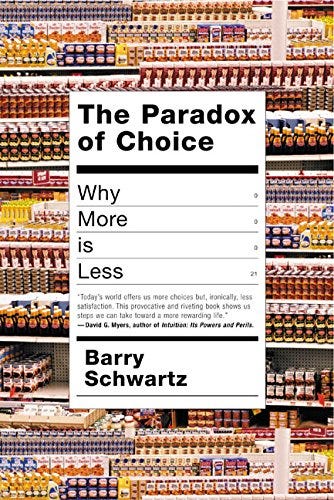Embrace the bad, the hard and the uncomfortable
There is good and bad in every choice
Life is not a problem to be solved, but a reality to be experienced. - Kierkegaard
Talking to other people can teach you a lot. The more I do, the more I realize how conspicuous it is to be lost and unsure of what to do next. At different levels, we are all confused about what to do. It seems to be the default condition of our time (maybe it has always been?).
We always worry about what direction we should take. Is the decision I've made the right one? Should I move, change jobs, end a relationship, or start something different? Even if it's not one of those big decisions, we are certainly struggling with any of the other ‘should’. Should I eat better? Should I be more creative? Should I take better care of my house, my skin, my pets...?
Unless you talk to others about it, you won't know that it is how everyone feels. You will soon think there's something wrong with you. That you are less fortunate and less decisive. That you can't make a decision, change your life, or live as you should.
But you are not alone. We are truly lost beings. We are just thinking apes immersed in an infinite forest of contexts, meanings, and ideas, each casting a different amount of light and shadow on us.
We all experience confusion and uncertainty on our journeys, but that doesn't mean we have a problem. Ultimately, there are no neat solutions to life or to the questions and problems that arise from it. In truth, all ideas and beliefs born out of the human mind are deeply flawed, but at the same time, most ideas and beliefs offer something. Some value, some insight, some context. As do our choices.
Despite what it may seem like, there are no choices that will make you 100% happy. This is nothing but a myth, even if a very prevalent one in our culture. A myth that keeps us in an endless loop of misery and wanting.
And the opposite is also true. No choice will bring you to ultimate hell. Even in the most challenging situations you can find yourself in, there are silver-linings to be found. That should comfort us. Any choice you make will bring you both positive and negative things with it, so just do whatever you feel will be best for you.
Positive thinking is highly prevalent in our society
We think we should always be happy and can only achieve happiness when there's absolutely nothing negative in our lives. But that's impossible. Living deals with both positives and negatives. All-of-the-time.
In the back of our heads, we think we will definitely find our perfect vocation, perfect job, perfect partner, and perfect house. And all of the other perfect things that will finally end our misery and longing. But we won't. Life will always include good and bad things, so we should learn to embrace them rather than search for all the perfect things, and live in perpetual misery.
I know it may sound obvious, but we still strive for perfect. For truly happy.
And the same applies to our constant search for comfort and minimized effort. Technology is constantly praised for making our lives easier. But what do we lose when there's less effort to be entertained for hours or get 24-hour delivery? What do we lose by having fresh strawberries year-round? There are usually costs associated with all the "progress" we make to make our lives easier. It is paid for with our privacy, our time, our mental health, other people's work and their health, and our environment.
Embracing the fact that life is not supposed to be easy, or flawless and that there are always negatives to it can also help us make difficult but ethically correct choices.
"Man stands face to face with the irrational. He feels within him his longing for happiness and for reason. The absurd is born of this confrontation between the human need and the unreasonable silence of the world.” - Albert Camus
This way of thinking has helped me with a difficult decision
I don't want children. However, due to societal pressure, the question comes to my mind constantly. I won't write about the many reasons I have to be child-free. There are hundreds of those online already. And, in the end, there's only one reason why we do something or don't do something: because we want to do it or don't want to.
The problem here is that having children is sold as the only possible right choice. That makes everyone who chooses otherwise constantly doubt themselves. The truth is that people with children will experience both favorable and adverse outcomes from this decision. The same applies to those who choose not to have children.
In making a choice, we always give up something, but we also open ourselves up to something new. We can't hope to always pick the right choices, because there aren't any. The choices you make will be right for you in some aspects and not so great in others. It's only when the positive outweighs the negative that you know that you've made the right decision.
It is likely that if the negatives of being a mom outweigh the positives you think you will get, you will opt not to do it. As I am pretty sure that people who do choose to have children see all the negatives as only small issues compared to all the positives they find in having them.
And that's the main point. The only point.
The reason why we choose to do things is because we put things in balance, no matter how unconsciously we do it. We have to remember that. There is no choice that is without its downside and life can never be perfect. Having this in mind is the only way we can find some breathing room and relax into our imperfect lives and selves.
Even though this book is 20 years-old, psychologist Barry Schwartz discusses something quite relatable in 2024. A common myth of modern civilization is that abundance makes you happier and that more choice is better for you. In The Paradox of Choice: Why More Is Less, he dispels this myth. Schwartz makes a compelling case for abundance draining the human spirit, spurring unreasonable expectations, and ultimately leaving us unsatisfied based on behavioral economics, cognitive psychology, and neuroscience.
The Seventh Seal (1957)
This classic movie explores the absurdity of being alive. During the Black Death, a knight is faced with Death with whom he wages his life in chess matches. While he gains more time to be alive he tries to find the reason for living.
The Good Place (Netflix)
Filled with moral dilemmas, The Good Place tells the story of Eleanor (Kristen Bell) in her afterlife. When the series starts, she has just died and find herself where the good people go to, or The Good Place. But, Eleanor wasn't a good person while alive and has lived in a very poorly manner. Because of that, she believes there was some kind of mix-up. She tries to hide her true nature so she is not sent to The Bad Place and ends up in funny situations.
Similar writings:













For a comedy, The Good Place had such an incredible twist!!! My anectodal observation is that you are very much not alone in your personal decision, Luiza, and more people are talking about it openly in a way that I hope will eventually change that societal pressure/assumption that there is no choice to be made / only one right answer for everyone. If you haven't read The Nine Lives of Rose Napolitano by Donna Freitas, you might love it! (A woman and her husband are fighting about their differing opinions on whether to have children, and how they handle the fight spurs nine different trajectories.)
first born's hip dysplasia cist $100000 by age 6. a 27-week preemie after cervical, cancer $1/4 mil. lotsa existing blobs of protoplasm to parent until you get bored and warehouse them in daycare.